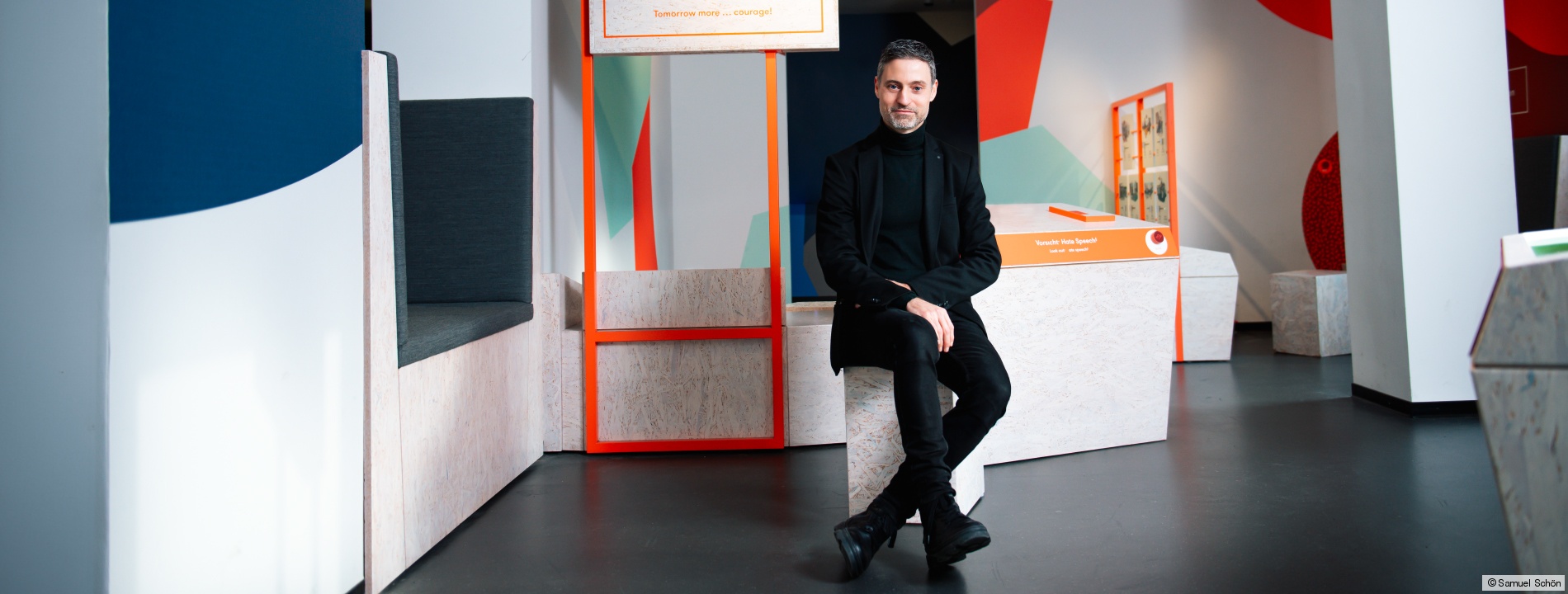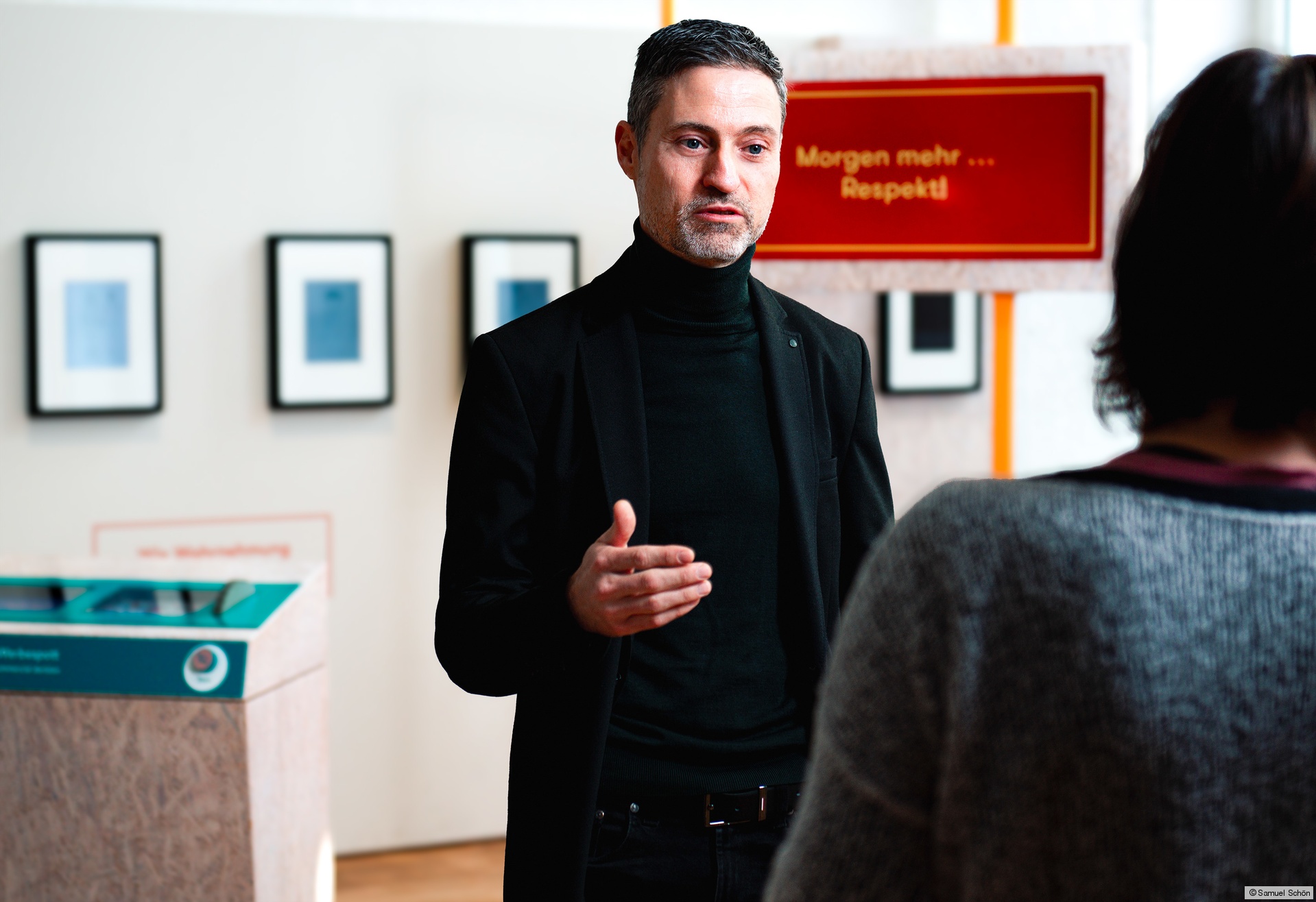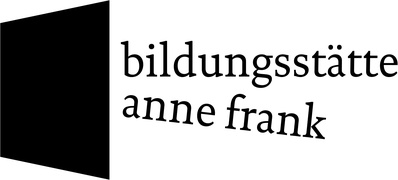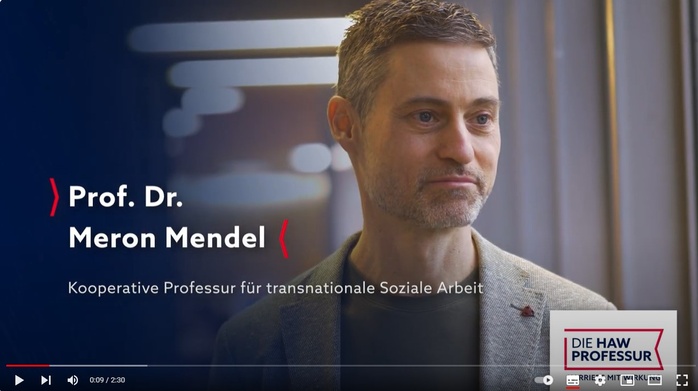Teaching & Research
2022-2023
„Antisemitismus und postkoloniale Debatte am Beispiel der documenta fifteen“ – joint research project of the Frankfurt UAS, the Anne Frank educational institution and the Documenta Institute (management: Prof. Dr. Meron Mendel and Prof. Dr. Heinz Bude), funded by the innovation fund of the Hessian Ministry for Science and Art. Project duration: 09/01/2022-12/31/2023.
2021-2024
„Dynamiken des Antisemitismus in Deutschland - Wandel und Funktion eines Ressentiments“ as part of BMBF funding. Project duration: 09/01/2021 – 12/31/2024.
Book publications/co-editorships:
- Frenemies. Antisemitismus, Rassismus und ihre Kritiker*innen. Berlin: Verbrecher Verlag, 2022 (mit S. Arnold /S. Cheema)
- Handbuch Erziehungswissenschaftliche Biographieforschung und Biographiearbeit. Weinheim und Basel: Beltz Juventa, 2022 (im Erscheinen) (mit D. Nittel und H. von Felden)
- Trigger-Warnung. Identitätspolitik zwischen Abwehr, Abschottung und Allianzen. Berlin: Verbrecher-Verlag, 2019 (mit S. Cheema/ E. Berendsen)
- 100 Jahre Leugnung. Der Völkermord an den Armeniern. Münster: Aschendorff Verlag, 2017 (mit K. Kunter, Katharina und O. Fassing)
- Fragiler Konsens. Antisemitismuskritische Bildung in der Migrationsgesellschaft. Frankfurt am Main: Campus Verlag, 2017 (mit A. Messerschmidt)
- Menschenrechte in Erziehung. Ansätze und Arbeitsinstrumente. Frankfurt am Main: Bildungsstätte Anne Frank, 2016.
- Deutscher Kolonialismus – Ein vergessenes Erbe? Postkolonialität in der rassismuskritischen Bildungsarbeit. Frankfurt am Main: Bildungsstätte Anne Frank, 2015.
- Jüdische Jugendliche in Deutschland. Eine biographisch-narrative Analyse zur Identitätsfindung. Frankfurt am Main: Goethe Universität, FB Erziehungswissenschaften, 2010.
Publications in professional journals:
2021
- „Israel-Palästina-Debatte: Falsche Freunde im Hass vereint“ Blätter für deutsche und internationale Politik 7, S. 25-28, 2021.
- "Globaler Antisemitismus und die Universalisierung der Shoah. Konstellationen der politischen Bildungsarbeit" Zeitschrift für Pädagogik und Theologie, vol. 73, no. 2, 2021, pp. 190-201, 2021 (mit T. Uhlig)
- „Wann sind Verschwörungsmythen auch antisemitisch?“ In: Jahresbericht 2020, Stiftung niedersächsische Gedenkstätten, S. 18-21 (www.stiftung-ng.de/fileadmin/dateien/Stiftung/ueber_uns/Jahresberichte/Jahresbericht_SNG_2020_Web.pdf), 2021.
- „Katharsis oder Bildung. (Dys-)funktionale Strategien gegen Antisemitismus.“ In: Kaya, Z. Ece / Rhein, Katharina (Hrsg.): Rassismus, Antisemitismus und Antiziganismus in der postnationalsozialistishen Gesellschaft. Weinheim Basel: Beltz Juventa, S. 175-194, 2021 (mit T. Uhlig).
- „Schaut hin! Jüdisches Leben jenseits der Klischees.“ In: RPI Impulse Sonderheft zum ÖKT, S. 43, 2021.
- „Aus der Geschichte gelernt? Warum uns die Erinnerungskultur nicht vor Antisemitismus und Rechtsextremismus schützt.“ In: Loccumer Pelikan 1/2021, S. 25-31, 2021.
2020
- „Weil nicht sein kann, was nicht sein darf“. Herausforderungen antisemitismuskritischer Bildungsarbeit. In: Aus Politik und Zeitgeschichte, H. 26-27, https://www.bpb.de/apuz/311627/herausforderungen-antisemitismuskritischer-bildungsarbeit , 2020.
- „Apokalyptische Ressourcen. Grenzen der postkolonialen Kritik am Beispiel Achille Mbembes.“ In: Texte zur Kunst, H. 119, S. 95-107, 2020 (mit T. Uhlig)
- „Anne Frank. Morgen mehr.“: Ein außerschulischer Lernort im digitalen Zeitalter. In: Seminar, H. 2, S. 34-40, 2020.
- Bildungsarbeit gegen Antisemitismus. In: Demokratie als Gesellschaftsform, 7. Jahrbuch Demokratiepädagogik. Schwalbach am Taunus: Wochenschau Verlag, S. 250-258, 2020.
- „Salat, Boykott und Antisemitismus. Eine persönliche Bilanz zur BDS-Frage.“ In: pax_zeit 1-2020. Berlin: pax Christi Deutsche Sektion e.V. https://www.paxchristi.de/s/downloads , 2020.
2019
- „Anne Frank im digitalen Zeitalter.“ In: merz. medien + erziehung, H. 3, S. 39-44, 2019.
- „Das Antisemitismus-Paradox. Wie äußert sich Judenhass heute? In: zeichen. Antisemitismus. Berlin: Aktion Sühnezeichen e.V., H. 2, S. 4-5, 2019.
- „Parallelgesellschaft? Eigentlich sollten wir alle in einer Parallelgesellschaft leben! In: Demokratieförderung vs. Politische Bildung?“ Journal für politische Bildung. Frankfurt am Main: Wochenschau Verlag, H. 2, S. 50-53, 2019.
- „Jung, brutal, gutaussehend. Antisemitismus im Schatten deutscher Erinnerungskultur.“ In: Andresen, Sabine/ Nittel, Dieter/ Thompson, Christiane (Hrsg.): Erziehung nach Auschwitz bis heute. Frankfurt am Main: Frankfurter Beiträge zur Erziehungswissenschaft, H. 22, S. 125-144, 2019 (mit K. Rhein und T. Uhlig)
- „Rechtspopulismus und Judenfeindschaft.“ In: Kiesel, Doron (Hrsg.): Perspektiven jüdischer Bildung. Leipzig: Hentrich & Hentrich, S. 273-275, 2019.
- „Kein Platz für Judenhass – ein fragiler Konsens“. In: epd Dokumentation, H. 23, S. 60-64, 2019.
- „Zu queer um wahr zu sein.“ In: Berendsen, Eva/ Cheema, Saba-Nur/ Mendel, Meron (Hrsg.): Trigger Warnung. Berlin: Verbrecher Verlag, S. 151-163, 2019 (mit J. Erkens)
2018
- „Ethnischer Nationalismus – eine pädagogische Herausforderung.“ In: Biskamp, Floris/ Cheema, Saba-Nur/ Kleff, Sanem/ Mendel, Meron/ Seidel, Eberhard (Hrsg.): Transnationaler Extremismus. Berlin: Aktion Courage e.V., S. 41-61, 2018 https://www.schule-ohne-rassismus.org/wp-content/uploads/2020/03/Baustein-6-Transnationaler-Extremismus-web.pdf
- „Antisemitismuskritische Bildung - ein heuristisches Konzept? In: Demokratie gegen Menschenfeindlichkeit 3, H. 1, S. 103-112, 2018.
- „Raus mit der Sprache.“ In: Vorländer, Martin (Hrsg.): Sehnsuchtsort Heimat. edition chrismon, S. 162-167, 2018.
2017
- Einleitung. In: Mendel, Meron/ Messerschmidt, Astrid (Hrsg.): Fragiler Konsens. Antisemitismuskritische Bildung in der Migrationsgesellschaft. Frankfurt am Main: Campus, S.11-23, 2017.
- „Challenging Postcolonial. Antisemitismuskritische Perspektiven auf postkoloniale Theorie.“ In: Mendel, Meron/ Messerschmidt, Astrid (Hrsg.): Fragiler Konsens. Antisemitismuskritische Bildung in der Migrationsgesellschaft. Frankfurt am Main: Campus, S. 249-267, 2017 (mit T. Uhlig)
- „Historische und aktuelle Bezüge in der politischen Bildungsarbeit.“ In: Broden, Anne/ Hößl, Stefan E./ Meier, Marcus (Hrsg.): Antisemitismus, Rassismus und das Lernen aus Geschichte(n). Weinheim und Basel: Beltz Juventa, S. 57-76
2016
- „Ist die Geschichte des Nationalsozialismus ein perfektes Lehrstück?“ In: Zeichen 3, 2016 https://www.asf-ev.de/fileadmin/Redaktion/Dateien/Publikationen/Zeitschrift_zeichen/zeichen_2016/ZEICHEN_No.3_2016.pdf
2015
- „Das Kind beim Namen nennen? Rassismussensible Sprache in der Bildungsarbeit.“ In: Außerschulische Bildung. Zeitschrift der politischen Jugend- und Erwachsenenbildung 3, 2015. https://www.demokratie-leben-in-wiesbaden.de/wp-content/uploads/2020/04/Mendel_Rassismussensibel.pdf
2014
- „Jüdische Kindheit und Jugend im Nachkriegsdeutschland. Autobiographische Berichte der „zweiten Generation“. In: Das Ende der Kindheit. Jüdische Kindheit und Jugend ab 1900. Wien: Institut für jüdische Geschichte Österreichs, S. 64-71, 2014
2011
- „Menschenrechtspädagogik“. In: Hafeneger, Benno (Hrsg.): Handbuch Außerschulischer Jugendbildung. Grundlagen-Handlungsfelder-Akteure. Schwalbach/ Ts.: Wochenschau Verlag, S. 357-367, 2011.
2010
- „Mind the Gap: Über Bilder und Realität russischer Juden in Deutschland.“ In: Gillis-Carlebach, Miriam/ Vogel, Barbara (Hrsg.): Becoming visible, Jüdisches Leben in Deutschland seit 1990, S. 143-152, 2010.
- ‚Man muss einmal ausgewandert sein, damit man versteht, was das heißt": Migration aus der Perspektive junger russischer Juden in Deutschland. In: Belkin, Dmitrij/ Gross, Raphael: Ausgerechnet Deutschland. Jüdisch-russische Einwanderung in die Bundesrepublik. Frankfurt am Main, S. 115-117, 2010.
- „Jungsein – Judesein – Dasein? Perspektiven für jüdische Jugendarbeit in einer heterogenen Gemeinschaft.“ In: Bodemann, Y. Michal/ Brumlik, Micha. "Denk ich an Deutschland…" Jüdische Perspektiven in Deutschland. Göttingen, S. 265-271, 2010.
2007
- Aufgewachsen zwischen zwei Welten – Zur Identität der zweiten Generation jüdischer Jugendlicher im Nachkriegsdeutschland. In: Trumah 17, S. 79-90
2004
- The Policy for the Past in West Germany and Israel: The Case of Jewish Remigration. In: The Leo Baeck Institute Year Book 49, H.1, S. 121-137, 2004.
- Member of the jury for the German Non-Fiction Prize 2022
- Board of Trustees of the ITES Institute (Institute for Theory and Empiricism of the Social) Workshop for Social Pedagogical Thinking e.V.
- Advisory board of the RPI-Religious Education Institute of the Evangelical Church of Kurhessen-Waldeck and the Evangelical Church in Hesse and Nassau
- Jury for the selection of the projects in the festival year 2021, 1700 years of Jewish life in Germany e.V.
- Jury Frankfurt School Prize Scientific Advisory Board of the Documentation Center National Socialism Freiburg (under construction)
- Scientific advisory board for the exhibition "Frankfurt and the NS", Historical Museum Frankfurt
- Project Advisory Board "Anti-Semitism in Adolescence", University of Duisburg-Essen, Faculty of Education
- Project Advisory Board "MOND - Migrant Organizations Network for Democracy", KUBI Association for Culture and Education e.V.
- Editorial board of the magazine "extracurricular education", working group of German educational institutions (2013-2019)
- Youth Fund Advisory Committee, Rothschild Foundation Europe, London (2008-2017)
In Conversation with Prof. Dr. Meron Mendel
Mr. Mendel, you have been holding a cooperative professorship at Frankfurt UAS since 2022. What did your path to our university look like?
I did my doctorate at Goethe University in Frankfurt and accepted teaching positions there from 2010 to 2021. At the same time, I always had many connections with the Frankfurt UAS: colleagues, for example, published in anthologies that I edited. There have also always been requests from students for practical semesters or internships, or professors have integrated the Anne Frank educational institution's offerings into their seminars. Therefore, I knew the work of those who are now my colleagues.
Why did you choose the cooperative professorship career format?
After completing my doctorate, I became the director of the Anne Frank Educational Center. In parallel to managing the institute and practical work, I also continued to pursue my academic career and teaching by publishing books and articles in specialist journals and accepting teaching positions. When the opportunity arose to take on the cooperative professorship, I thought, this is exactly what I do all the time: the connection between science and practice.
How does the cooperative professorship differ from a full HAW professorship?
You are a servant of two masters, and that always has advantages and disadvantages. The advantage is that you have an outside view and a balance. The disadvantage is that you sometimes end up in a situation where you are being pulled on from both sides: If dates at my two deployment locations overlap, then it is difficult to find a good balance. Because both locations are just as important to me.

As a cooperative professor, you have a teaching load of 9 semester hours per week. How do you deal with this, especially in terms of preparation time?
Since I acquired many projects, I was able to reduce my teaching load. I have been teaching five semester hours since the beginning of my professorship, and based on my project work, this will remain the case until 2026. Research is an important focus for me. That's why I actually have three pillars: practice, teaching and research. I would not like to give up any of these three pillars because they complement each other well. My research would be completely different without teaching and practice. On the other hand, my practice would also be different without teaching and research. For me everything belongs together. But you have to organize it well in terms of time.
When teaching, it is important to take time to support students on their path to a career - not only in the coursework, but also in 1:1 supervision. As teachers, we don't just have the responsibility to pass on a certain material. We are also role models. Because the students are looking for a suitable career. And there is a lot of information about this that is not only conveyed in the curriculum. I also see that as my job.
As a university of appplied sciences, we are very practice-oriented. How does your practical work specifically affect your work at the university?
I teach a module that deals with project management. There I accompany the students in small groups in the planning and implementation of micro-projects. These are prepared in the first semester and implemented in the second semester. I am very rooted in urban society and, for example, I work with the social welfare office in various accommodations for refugees. I use these contacts when communicating and implementing projects with students. I go into the field with them, supported by people I have known for many years and with whom I have been cooperating for a long time. So I create these connections. A second example is a module that deals with discrimination. The anti-discrimination work and concepts that the Anne Frank educational institution has developed and tested in recent years are incorporated into the teaching of this module.
How did your colleagues at the educational institution react to you reducing your working hours by 50 percent?
The start of my cooperative professorship was associated with a structural change in the institution: my deputy Deborah Schnabel became co-director. We have been running the educational institution as dual leadership since the start of the cooperative professorship. She increased while I reduced. It was exactly the right thing for the organization that I brought someone in after eleven years in which I was the sole manager and implemented my ideas and concepts. In certain areas this has meant further development. It was also a good way to change weights in the setup. But I also had to and wanted to withdraw from everyday business in certain areas. This automatically created more space for my co-leadership in which she can now develop and get her ideas off the ground. Looking back, it was a win-win situation.
Thank you for the interview!
Practice Partner
„The Anne Frank Educational Center develops innovative concepts and methods to sensitize young people and adults to anti-Semitism, racism and various forms of discrimination. Dovetailing this work in the form of a collaborative professorship with the Frankfurt University of Applied Sciences consolidates the many years of good cooperation and is logical in terms of content and methodology"
Marie-Sophie Adeoso, Deputy Head of Communications & Event Management at the Anne Frank Educational Center
‘The extension of the contract shows that everyone involved wants to continue and stabilise the collaboration. With this planning security, we can expand the cooperation. The need is currently particularly great in my research area - strengthening democracy.’
Prof Dr Meron Mendel in February 2025
Dear Mr Mendel, your cooperative professorship has now been terminated. What does this mean for your future work at the university and your role at the Anne Frank Educational Centre?
Since the establishment of the cooperative professorship, we have already initiated several projects for academic-practical exchange. The permanent nature of the programme shows that everyone involved wants to continue and consolidate the collaboration. With this planning security, we can expand the cooperation. The need is currently particularly great in my research area - strengthening democracy.
What particular opportunities, but also challenges, have arisen for you in the combination of teaching, research and practice?
The self-image that science should be closely intertwined with society is becoming increasingly important for many universities. This ‘third mission’ means that we as a university should get more involved in social debates and at the same time utilise impulses from society more for our research and teaching. I recognise a great openness to this exchange at Frankfurt UAS. However, it is not an easy process, especially in times when society is polarised on many issues.
In your first interview about the cooperative HAW professorship, you emphasised that lecturers not only impart knowledge, but also act as role models for students. How do you try to actively fulfil this role in your teaching?
This question is best put to my students. I try to make my courses interactive and dialogue-based. It's not just about conveying new facts or information, but about showing how to classify, analyse and evaluate knowledge. This can only succeed in an open and good learning atmosphere in which students feel valued.
How do students experience your practice-orientated teaching?
A good example is the more than thirty micro-projects that my students have realised under my supervision. In the seminar, we analysed where current social needs are particularly pronounced and developed solutions. This resulted in several projects in refugee centres, with drug addicts or in retirement homes. We cooperate with social organisations and associations in the city. Everyone has benefited from the cooperation: the organisations have been delighted with the motivated helpers and the students have gained practical experience.
How do you deal with students bringing current social debates (not just on the topic of anti-Semitism) into your courses?
Universities have always been places of political and social debate. The protest movement of 1968 is just one example of this. It is part of the task of lecturers and the university to take up these issues and engage in dialogue with students.
In addition to teaching, you have led several research projects on anti-Semitism and political education. What findings from these projects are particularly relevant for social work practice?
One current project is looking at social media and disinformation campaigns. We have found that in times of crisis (such as during the COVID-19 pandemic), vulnerable groups are particularly susceptible to conspiracy thinking and disinformation. Social workers should be trained accordingly on how to argue against this. We are currently trialling methods and argumentation training for social workers.
Thank you for the interview.






